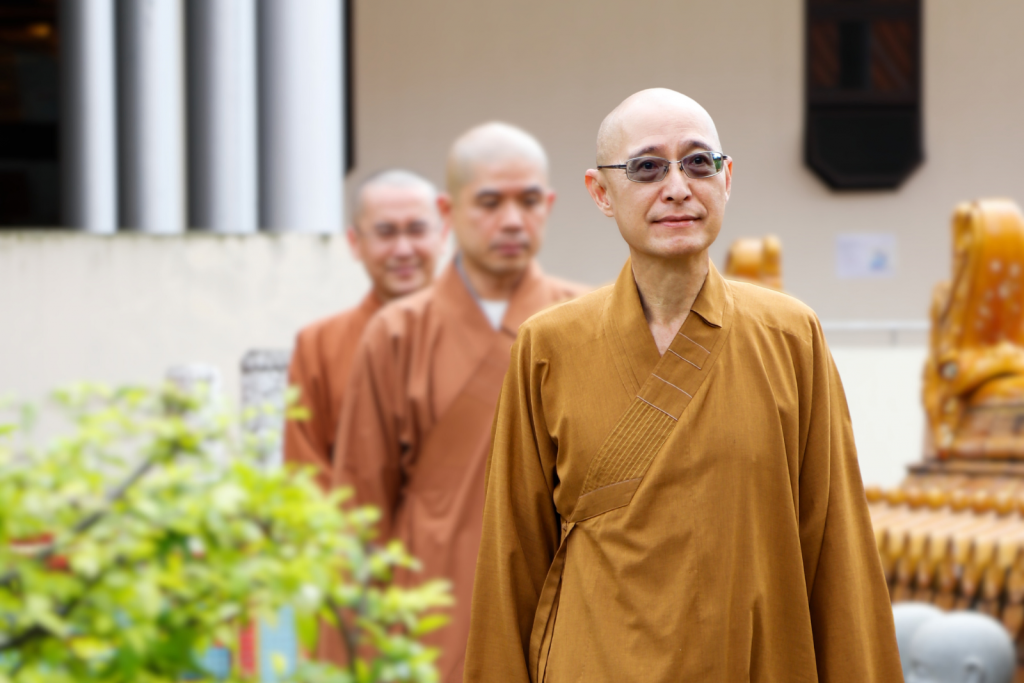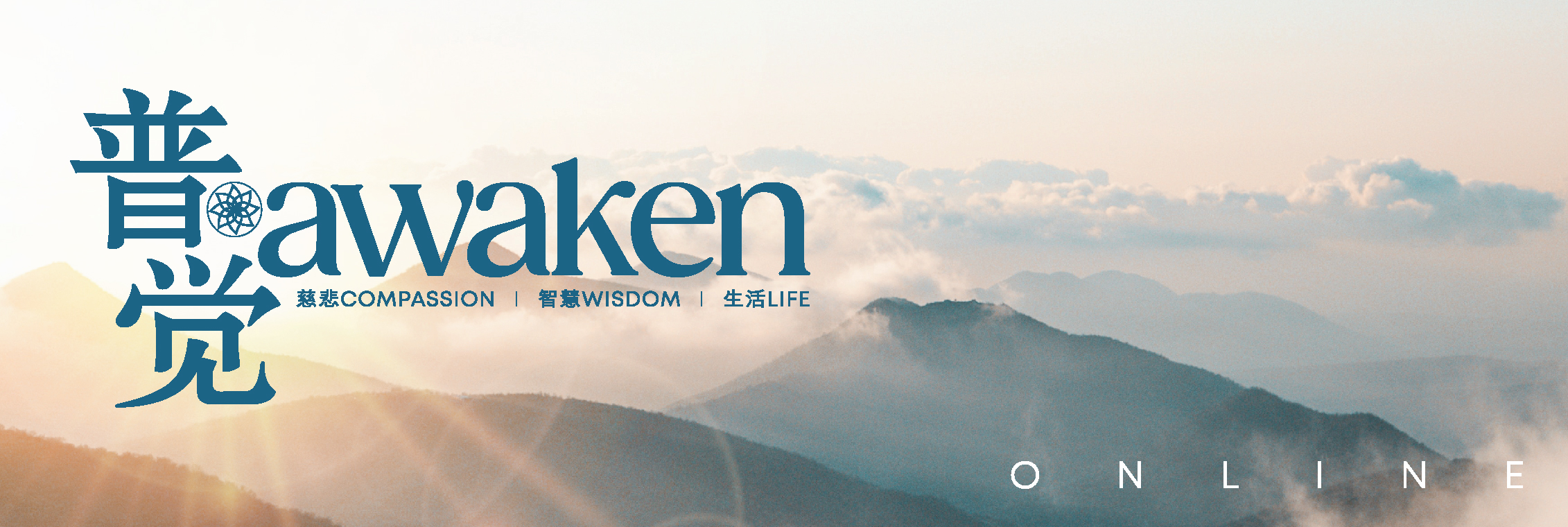Beyond the Self 超越自我

Venerable Chuan Sheng’s Journey to Monkhood
At some point in life, many people may wonder about the deeper meaning of life and seek a purpose beyond their career success and material gains. This moment of reflection occurred to Venerable Chuan Sheng in his 40s. Despite his success in his career at the National University of Singapore (NUS), he was driven to explore the essence of existence beyond professional achievements.
His grasp of Buddhism, rooted in his childhood and enriched by his undergraduate studies in philosophy, became more than just an academic subject. As he engaged himself in Dharma talks, classes, and meditation practices across various Buddhist traditions, Buddhism became a way of life rather than a subject of study.
As he neared 50, Venerable Chuan Sheng decided to retire early, dedicating his life to spiritual development and community service. His turning point came when he joined a short-term novice monk programme at Kong Meng San Phor Kark See Monastery (KMSPKS), which included a 10-day retreat to Bodhgaya, India. This experience deeply moved him. “I thought, maybe I can explore becoming a monk — it is one way of contributing to society and deepening my understanding of spiritual matters,” he reflects.
Upon returning, Venerable Chuan Sheng approached Venerable Kwang Sheng, the abbot of KMSPKS, with the hope of joining the monastic community. With the support of his siblings, who assured him they would care for their ageing parents, he was able to pursue his calling without worry. “Because KMSPKS is a local monastery, my family knew I would remain based in Singapore, which probably made things easier,” he shares.
Venerable Chuan Sheng concluded his 26-year academic career at NUS and joined KMSPKS as a resident monk at the age of 51.
Entering Monastic Life
Shortly after his ordination, Venerable Chuan Sheng travelled to Taiwan for higher ordination, where he underwent an intensive month-long training on the fundamentals of monasticism alongside fellow monk Venerable Chuan Hang. “The training was rigorous and challenging, and we learnt a great deal while living with several hundred fellow monastics,” he recalls.
Upon his return to KMSPKS, he continued his studies under the compassionate guidance of his ordination master, Venerable Kwang Sheng. With his academic background, he was appointed Vice-Rector of Academic Affairs at the Buddhist College of Singapore (BCS).
Today, Venerable Chuan Sheng’s daily life is a harmonious blend of spiritual practice and academic responsibilities. Each morning begins with mindfulness meditation, chanting and reflection, while the rest of his day is dedicated to overseeing the curriculum at BCS where he works with monastic and lay staff to educate the next generation of Buddhist leaders. “Time management and prioritising responsibilities are key to balancing a steady progress in spiritual cultivation and avoiding burnout,” he emphasises.
To keep his physical health in good shape, Venerable Chuan Sheng tries to practise Taiji, walk 10,000 steps, and climb 20 flights of stairs daily.
Community service also plays a role in his monastic life. He engages in various activities, from supporting inter-religious dialogues to promoting Buddhist education and applying the Dharma in ways that promote understanding and compassion within the broader community.
Finding Joy and Fulfilment in the Present
Contrary to common misconceptions, Venerable Chuan Sheng highlights that monkhood does not mean severing ties with family and friends. “I keep in touch with my family and friends through calls and occasional meetings,” he says.
One of the most fulfilling aspects of his new life is the opportunity to learn and teach Buddhist practices in a supportive environment. “We all learn from each other — monastics, lay staff, volunteers, and devotees — under the wise guidance of Venerable Kwang Sheng,” he shares.
On top of this, he finds great joy in watching the growth of student monks at BCS, where he feels a deep sense of purpose in knowing that many of them will go on to pursue postgraduate degrees in fields such as Buddhist Studies, Applied Buddhism, Buddhist Counselling, Buddhist Chaplaincy, and Religious Studies, and that they will be well-prepared for future leadership roles in their communities.
Venerable Chuan Sheng also shared that he derives happiness from living fully in the present moment, free from the distractions of past regrets or future anxieties. “As my faith in Buddhism deepened, it became easier to let go of views and expectations of how life should be.” He now sees life’s twists and turns as opportunities for growth and discovery. “I’ve learned to be grateful for the people and situations that come into my life, as they represent the different lessons I need to address,” he adds. For him, this journey is one of lifelong learning, a process that continues to unfold with each new day. Rather than being overwhelmed by challenges, he approaches every situation with good-heartedness and a sense of humour.
With his background in history, Venerable Chuan Sheng appreciates the diverse experiences of monastics across different times and cultures. He recognises that monastics, like everyone else, are human and imperfect. Everyone is shaped by their social and cultural environment and upbringing values. With this perspective, he stresses the importance of continual adaptation to changing circumstances. “We need to learn from our mistakes to keep growing and maturing in life,” he concludes.
An invitation to Explore
In today’s fast-paced society, individuals may overlook the enriching and meaningful path of ordination. Venerable Chuan Sheng believes that opportunities like short-term retreats can offer much-needed space for reflection and growth. “Learn more about what to expect by speaking with monastics from the Buddhist tradition and the institution you wish to be ordained in. Join temple activities like stays and short-term retreats to see if you can adapt to its environment. Do discuss your intention with your family. It’s important to have their blessings before pursuing this calling,” he advises.
The path to monkhood is not merely about renunciation; it invites individuals to embrace a life rich in clarity, peace and purpose.
传圣法师的出家之路
在人生的某个阶段,许多人会开始寻找生命的意义,试图寻求一种超越成就与物质追求的内在价值。对传圣法师而言,这种内在的反思出现于四十多岁的时候。尽管当时他在新加坡国立大学已然事业有成,但他的心底却升起了一种追寻——探求生命的本质与意义。
传圣法师自幼接触佛法,又在大学期间深入研习哲学,佛教对他而言并非只是一种学术项目。当他沉浸于各类佛法讲座、课程以及不同传统的禅修实践时,佛教已在不知不觉中渗入他的生活,不再只是一种学术研究的目标与方向。
接近五十岁时,他决定提前退休,投身到修行与社区服务。当他参与光明山普觉禅寺的短期出家活动时,经历了为期十天的印度菩提伽耶之行,这也成为了他的人生转折点。此行让他深受感召,回忆起当时的心境,他说道:“或许,我可以尝试出家。这不仅是为社会奉献的一种方式,更是虔心向道的一个契机。”
回国后,传圣法师前往寺院拜访方丈广声法师,表达了自己的出家意愿。兄弟姐妹得知后给予全力支持,承诺悉心照料年迈的父母,让他无后顾之忧。他说道:“光明山普觉禅寺作为本地寺院,家人知道我会常住新加坡,这无疑让他们更加放心。”
就这样,他告别了长达二十六年的新加坡国立大学学术事业,在五十一岁时正式剃度,成为光明山普觉禅寺的常住僧众。
进入僧团修行
剃度不久,传圣法师便前往台湾受比丘戒,在那里接受了为期一个月的密集僧团训练。那段时间,他与同修传航法师一同修习,回忆起那段经历,他说道:“训练既严格又富有挑战,我们与数百位僧侣一同生活,过程中获益良多。”
回到光明山普觉禅寺后,他在戒师广声法师的慈悲引导下继续精进修学。基于传圣法师多年的学术经验,他被委任为新加坡佛学院的学术副院长,负责学院的课程与教学管理。
如今,传圣法师将修行与学术结合到日常生活当中。他的一日之计始于正念禅修,每日除了诵经与拜忏之外,白天也会投身于佛学院的教务职责,与僧俗教职员共同培育未来的佛教领袖。他表示:“学习时间管理,优先及合理地安排所有职责,是保持精进修行的重要之道,是避免精神耗竭之根本。”
为保持身心平衡,传圣法师每天都会修习太极,力求每日行走万步,并爬楼二十层,以此强健体魄。
服务大众也是他僧侣生活中的一部分。他参与各种活动,从支持宗教间的对话到促进佛教教育等,他希望运用佛法促进社区之间的理解与慈悲。
当下的喜悦与满足
与大众对僧侣生活的固有印象不同,传圣法师指出,出家并不意味着切断与家人朋友的联系。他说道:“我仍会与家人朋友保持联系,通过电话或偶尔的相聚来维系这段缘份。”
他认为出家生活最满足的一方面,是能够在支持与包容的环境中学习并弘扬佛法。他分享道:“在广声法师的智慧引领下,我们——僧侣、职员、义工、信众——皆在互相学习,共同进步。”
此外,他从佛学院的学僧成长中获得了莫大的喜悦,尤其想到其中的许多人未来将在应用佛教、佛教心理辅导、佛教慈护师及宗教学等领域继续精进深造,为担负如来家业做好更充分的准备。
传圣法师还谈到,通过安住身心,活在当下,他收获了真正的内心平静,不再被过去的遗憾或未来的忧虑所困扰。他说:“随着我对佛法信念的加深,我学会放下对生活的执念与期望。”在他眼中,生活中的起伏已化为成长与发现的契机。他补充道:“我学会了感恩。感恩那些出现在我生命中的人和事,因为他们皆是我需面对与领悟的人生课题。”对他而言,这是一条不断学习的旅程,每一日都是新的启迪。他以善意与幽默应对生活中的波折,不再被境遇所困。
凭借传圣法师的历史学术背景,他对不同文化与时代的僧侣生活深有所感。他洞悉,僧侣与常人一样,带有各自的文化与社会印记,也有人性的不完美。他强调道,僧侣必须与时俱进,适应变化,以更好地履行所承担的责任。他总结道:“我们需从错误中学习,在生活的历练中不断精进与成长。”
探索的邀约
在当今快节奏的社会中,出家这一条充满殊胜智慧的道路常被世人忽略。传圣法师认为,短期出家体验等机会能为现代人提供一个宝贵的自省与成长空间。他建议道:“可以通过与僧侣交流、参加寺院或短期出家活动来了解这一道路是否适合自己,同时也应与家人沟通,获得他们的支持。”
出家不仅是一种放下,更是一种接纳,让人拥抱清净、安然且充满意义的生活。

